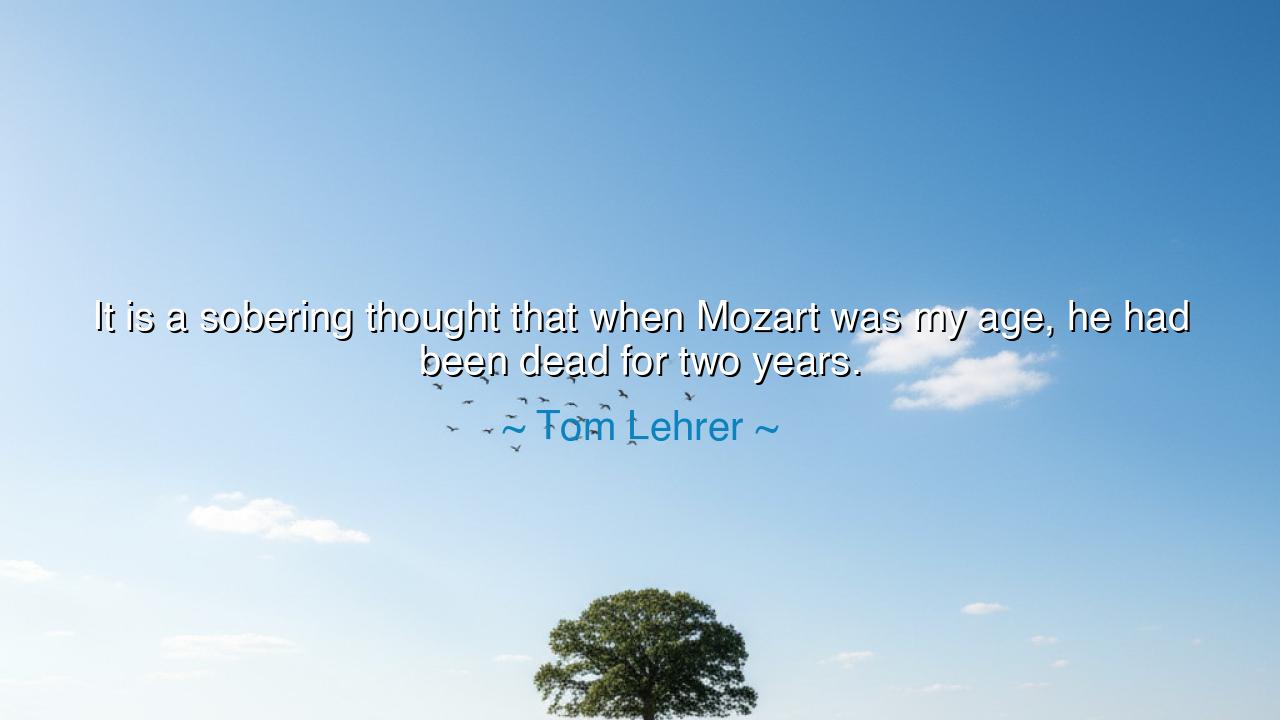
It is a sobering thought that when Mozart was my age, he had been






"It is a sobering thought that when Mozart was my age, he had been dead for two years." These words from Tom Lehrer, a gifted satirist and mathematician, capture the essence of life's ephemeral nature and the strange tension between genius and mortality. Lehrer, known for his humor and wit, contrasts his own life with that of Mozart, one of the greatest composers in history. By acknowledging that Mozart, who created some of the most sublime music known to humankind, had already passed at an age when Lehrer was still alive, he invites us to contemplate the fleeting nature of time and achievement. This statement is not just a reflection on the brevity of life, but a meditation on how history remembers the truly extraordinary—those whose genius shines bright but whose time on earth is remarkably short.
In the teachings of the ancients, there was an understanding that life was finite—and that the greatest human endeavors, whether artistic or otherwise, are always at risk of being cut short. Heraclitus, the Greek philosopher, famously declared, "You cannot step into the same river twice," acknowledging the constant flow of time. For the ancients, time was not just a linear progression, but a force that shaped everything from the seasons to human existence. The Romans, in their reflections on life, often meditated on mortality—with figures like Seneca and Marcus Aurelius encouraging people to live virtuously and with awareness of their mortality. The brevity of life was not to be feared but embraced, for in embracing it, one could live with purpose and clarity, always striving to leave a mark on the world, however brief that impact might be.
Consider the life of Alexander the Great, whose conquests and military genius seemed limitless. By the time Alexander reached the age of 32, he had already created one of the largest empires the world had ever seen, stretching from Greece to India. Yet, he died unexpectedly, at the height of his power, leaving the world to wonder what could have been if he had lived longer. Alexander’s untimely death serves as a powerful example of how greatness does not guarantee long life, and that history sometimes remembers those who burn brightly for a short time, leaving an indelible impact despite their brief existence. In this way, Lehrer's quote echoes the truths of ancient philosophy: genius can arrive early, but time is a fleeting force that can easily end the brightest of lives.
Mozart’s life, though marked by extraordinary creativity, was tragically short. He composed his greatest works, including some of the most sublime operas, symphonies, and chamber music, before his early death at the age of 35. By all accounts, his life was filled with hardship, financial instability, and personal struggle, yet his musical output was unparalleled. Tom Lehrer’s reflection on Mozart’s age at the time of his death brings into stark focus the contrast between Mozart’s brilliance and the brevity of his life. The idea that someone so young, yet so immensely talented, could achieve so much before death overtook him is both humbling and sobering. Mozart’s story serves as a reminder that time is not measured in years but in the impact one leaves in the world.
Lehrer's quote is a meditation on the inevitability of death and the urgency with which we must approach our own lives. Time, as Plato and Marcus Aurelius often reflected, is the most precious commodity. What Lehrer’s statement ultimately implies is that time waits for no one, and that genius—whether in art, thought, or action—can come at any age, but it is not guaranteed that we will be able to see it fulfilled. Mozart’s life, though short, was filled with profound contributions that have outlasted generations. But Lehrer’s reflection on his own age reminds us that our time on earth is limited, and the question we must ask ourselves is not just about achieving greatness, but about how we use our time to leave something meaningful behind.
The lesson that we take from Lehrer’s insight is simple yet profound: time is the great equalizer. We are all bound by it, and yet how we live within the confines of our fleeting years is what will ultimately determine our legacy. Wisdom does not necessarily come with age, nor does greatness need a lifetime to be realized. The question, then, is not how long we live, but how fully we live in the time we are given. Whether we seek to create art, change the world, or simply live a life of meaning, we must understand that our impact is shaped by how we engage with each day, knowing that, like Mozart, we are only given a certain number of moments to fulfill our purpose.
In practical terms, Lehrer’s reflection should serve as a call to action. We must not waste our time in idle pursuits or put off the things that matter most. Whether we are young or old, the opportunity to make a difference, to create, and to live with purpose is available to us at any moment. The lesson is not to focus on what we have left but on what we can do with the time we still have. Like Mozart, like Alexander, and even like Socrates before them, greatness is often defined not by how long one lives, but by how deeply one chooses to live, how passionately one engages with the world, and how much wisdom one can impart in the time granted. Let us not be deterred by the ticking clock but seize each moment with purpose and resolve.






AAdministratorAdministrator
Welcome, honored guests. Please leave a comment, we will respond soon